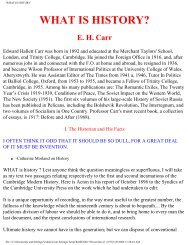The bronze age and the Celtic world - Universal History Library
The bronze age and the Celtic world - Universal History Library
The bronze age and the Celtic world - Universal History Library
You also want an ePaper? Increase the reach of your titles
YUMPU automatically turns print PDFs into web optimized ePapers that Google loves.
DURING<br />
Chapter XII<br />
THE ARYAN CRADLE<br />
<strong>the</strong> middle half of <strong>the</strong> nineteenth century <strong>the</strong> minds of many<br />
European savants were focussed upon what was termed <strong>the</strong> Aryan hypo<strong>the</strong>sis,<br />
which was investigated with more enthusiasm than discretion by comparative<br />
philologists in Engl<strong>and</strong> <strong>and</strong> France, <strong>and</strong> with still greater vigour in Germany. Since<br />
<strong>the</strong>n <strong>the</strong> general conclusions of <strong>the</strong>se mid-nineteenth century speculations have<br />
been current among pohticians <strong>and</strong> journahsts, who talk glibly about Teutons <strong>and</strong><br />
Celts <strong>and</strong> Slavs, <strong>and</strong> that medley of races <strong>and</strong> peoples, who still continue to use in a<br />
modified form <strong>the</strong> speech imposed upon <strong>the</strong>m by <strong>the</strong>ir Roman conquerors, <strong>and</strong> are<br />
<strong>the</strong>refore called <strong>the</strong> Latin race. Such terms, meaningless though <strong>the</strong>y are as applied<br />
to nations, have become popular during <strong>the</strong> last half century, with disastrous results,<br />
since <strong>the</strong>y have been used to emphasise certain divisions which were growing up<br />
among European peoples, <strong>and</strong> which in <strong>the</strong>ir turn did much to give rise to <strong>the</strong> European<br />
war, <strong>and</strong> are stiU retarding <strong>the</strong> Peace for which everyone is longing.<br />
<strong>The</strong> idea was first put forward in 1786, when Sir William Jones,' in a<br />
communication to <strong>the</strong> Royal Asiatic Society of Bengal, pointed out <strong>the</strong> similarities<br />
between <strong>the</strong> Sanskrit, Greek, Latin, German <strong>and</strong> <strong>Celtic</strong> langu<strong>age</strong>s, but Httle progress<br />
was made until in^i833-5 Bopp* published his comparative grammar. For <strong>the</strong> next<br />
fifty years <strong>the</strong> hypo<strong>the</strong>sis grew at a great pace. <strong>The</strong> <strong>world</strong> was anxious for a scientific<br />
classification of its peoples, especially of <strong>the</strong> peoples of Europe. Men were also<br />
enquiring what had happened in this continent before early Greek legend <strong>and</strong> literature<br />
began to lift <strong>the</strong> veil. <strong>The</strong> sciences of anthropology <strong>and</strong> prehistoric archaeology were<br />
in <strong>the</strong>ir infancy, <strong>and</strong> unable to provide answers to <strong>the</strong>se questions, <strong>and</strong> <strong>the</strong> comparative<br />
' Jones (1788). 1 Bopp (1833), (1845-50), (1866-74).<br />
132







